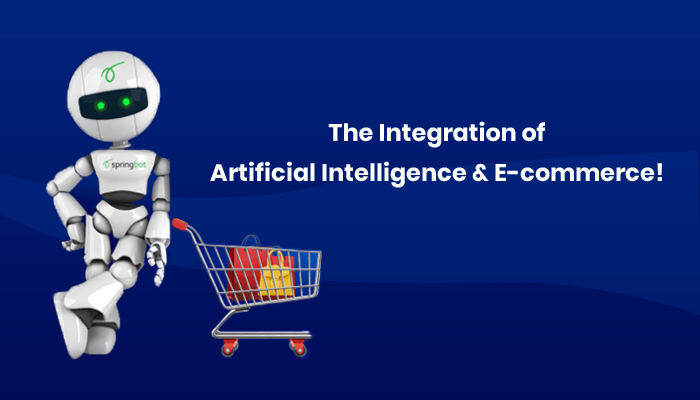The e-commerce landscape is undergoing a dramatic shift. Gone are the days of clunky websites and generic product listings. Today’s online shoppers expect a personalized, frictionless, and intelligent experience. So AI and e-commerce come together for to differentiate themselves and enhance customer satisfaction.
E-commerce
The statistics speak for themselves. According to eMarketer, global retail e-commerce sales soared to $6.5 trillion in 2023, accounting for a staggering 22.9% of total retail sales. In India alone, the e-commerce market is projected to reach a colossal $350 billion by 2030, fueled by a rapidly growing internet user base and widespread smartphone adoption [IBEF]. This exponential growth signifies a clear consumer shift towards online shopping, creating a fiercely competitive environment for businesses.
AI & E-commerce

With competition fiercer than ever, e-commerce businesses are constantly seeking ways to stand out. This is where AI comes into play, impacting various aspects of the online shopping experience.
Personalized Recommendations
Imagine a virtual shopping assistant who remembers your preferences, past purchases, and browsing history. This isn’t science fiction; it’s AI-powered recommendation systems. These systems analyze vast datasets to predict customer needs with incredible precision, suggesting highly relevant products. This personalized approach benefits both businesses (increased sales) and customers (a more relevant shopping experience).
Smarter Search
Frustrated by search bars that return irrelevant results? AI-powered search algorithms can interpret natural language queries, understanding the nuances of your search and recommending products that truly match your needs.
24/7 Customer Support
No more waiting on hold for customer service! AI-powered chatbots can answer customer queries efficiently, offering support around the clock. This not only improves accessibility but also frees up human resources for more complex issues.

Dynamic Pricing and Promotions
Gone are the days of static pricing. AI can analyze market trends, competitor pricing, and customer behavior to suggest optimal pricing strategies for businesses. Additionally, AI can personalize promotions for each customer, offering targeted discounts based on their past purchases and interests.
Fraud Detection and Risk Management
E-commerce fraud is a major concern, but AI can help mitigate these risks. By analyzing purchase patterns, AI can identify suspicious transactions and prevent fraudulent activities.
Expert Insights
Industry experts acknowledge the transformative power of AI in e-commerce. Here’s what some leading figures have to say:
Milan Sharma, Founder and MD, 35North Ventures
“Artificial Intelligence acts as a transformative force… by bringing significant enhancements across the sector… creating a highly personalized shopping experience, increasing the likelihood of customer engagement.” Sharma emphasizes the dual benefit of AI, not only for customer experience but also for optimizing supply chains and building greater efficiency.
Yasin Hamidani, Director, Media Care Brand Solutions
“AI is poised to revolutionize India’s e-commerce sector…” Hamidani highlights the multifaceted role of AI in personalizing recommendations, streamlining supply chain management, and optimizing pricing strategies. He also points to the importance of AI-powered chatbots in improving customer satisfaction and retention.
Ambika Sharma, Founder and MD, Pulp Strategy
“AI is revolutionising the e-commerce sector…” Sharma delves into the concept of AI-powered “stylists” and shopping assistants. These virtual companions use AI to analyze preferences, past behavior, and current trends to offer personalized fashion advice and product recommendations. This not only enhances the shopping experience but also increases customer engagement and satisfaction.
Challenges and Opportunities
While AI offers immense potential, there are challenges to consider. Data security is paramount, as AI systems rely on vast amounts of customer data. Algorithmic bias, where AI systems perpetuate existing societal biases, also needs to be addressed. Additionally, the ethical implications of AI-driven automation must be carefully considered.
Despite these challenges, the future of e-commerce undoubtedly lies in harnessing the power of AI. As technology continues to evolve and AI becomes more sophisticated, we can expect even more transformative experiences for online shoppers. Imagine virtual try-on experiences that allow you to see how clothes look on you before you buy, or intelligent logistics systems that optimize delivery routes for faster and more efficient shipping. The possibilities are truly endless.



























